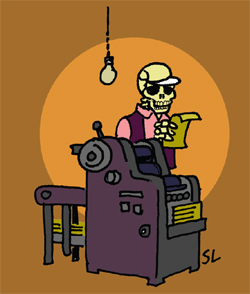 If you are like me, you have a life long love affair with print in all it’s manifestations—books, magazines, newspapers, graphic novels, comics books, posters, drink coasters—in short, anything you can feed through a press and slap some ink on can be the object of this affection.
If you are like me, you have a life long love affair with print in all it’s manifestations—books, magazines, newspapers, graphic novels, comics books, posters, drink coasters—in short, anything you can feed through a press and slap some ink on can be the object of this affection.
With the rise of the web and “new” media, newspapers and magazines are shrinking from reduced ad revenues and circulation. The venerable Punk Planet has folded, publishers of every stripe struggle to break even, and kids spend the majority of their reading time online, instant messaging and the like.
Sure, electronic media is stunning and fun, but a deep-seated part of me wants to bury my head in the sand and focus exclusively on print, for ever and ever.
I felt compelled to poll several of my colleagues in the ink stained world of comic books and graphic novels on the state of print today.
Jesse Reklaw, the cartoonist behind the weekly strip Slow Wave, is a keystone personality in the vibrant world of minicomics. “I think about this all the time lately. My feeling is that things are shrinking in some ways (newspapers, magazines), but growing in others (graphic novels, printed archives). Maybe we’re readjusting and getting better focus about WHAT should be in print…it is one of the most durable forms of information storage.”
Another lover of print, a true blue avatar of IS PRINT DEAD? OR DOES IT JUST SMELL FUNNY? art comics, Dylan Williams, cartoonist and publisher of Sparkplug Books, suggests a more active approach.
“I don’t believe print is dead. I’ve actually spent a lot of time thinking about what I’m trying to do with my life and I keep coming back to the idea of punk rock. I’ve been a punk since I was a kid and those values are really my core values. If you feel bad about stuff the only thing we can do is fight it. I love print, love drawing, and love art comics. I hate what comics became in the 90s, things like web comics, ‘the new independents’ and all the money-speak that took over comics bugs me. I’m an underground kid and that is my idea. I think, all we can do is light our little fires and stoke them. I don’t ever feel like giving up.”
Sparkplug has issued outstanding titles by the likes of Mats!? (Asiaddict), Renee French (Edison Steelhead’s Lost Portfolio), the gifted young artist Austin English (Windy Corner), and Williams’ own standout series Reporter, to name a few. Both Williams and Jesse Reklaw are in the vanguard of comics kids coming to full maturity—these are people who have vision, ambition and confi dence. They believe in print and are willing to bet their careers on it.
Veteran underground cartoonist and painter supreme Mary Fleener offers a historical perspective on how we got to where we are. “I think the print world began to die with the television. When radio was king, books were still popular because radio didn’t have the visual kick. Don’t forget, we humans are a lot like magpies—we like shiny things and TV provides that fix. However, today, print and TV are dying because there’s nothing of substance on either TV or within newspapers.”
Rob Clough, comics editor of Other magazine and a high profi le comics critic, joins Fleener in naming TV as the real culprit in the waning primacy of print, but holds out hope for the graphic novel.“Print as the dominant form of mass media is dying. That was precipitated by TV and is obviously being driven further home by the Internet and assorted gadgets. “That said, reading print is such a particular and visceral experience, that print will never completely go away. Instead, it’s going to become more of a boutique item, something done in smaller quantities. It’s why Fantagraphics will continue to thrive, and why print-on-demand services like Lulu will become even more prominent.”
“The good news about recent technology is that it will democratize the dissemination of information even further—everyone will have a chance to have their say. This will take the flow of information out of the hands of the corporate interests that have strangled it for nearly 150 years in this country.”
Looking to the future, I return to Jesse Reklaw, with his finger on the pulse of grassroots/DIY comics publishing. Jesse believes that the heart and soul, the true innovation in comics, rests in that grassroots/DIY world, and how can anyone deny that self-evident truth? He cites the emergence of several annual awards for mini-comics as symbolic of the durability of print based comics:
“The minicomics awards (this year we’re offering a cash prize of $300 to the best mini!). I think the fact that people are rewarding mini-comics makers, and encouraging them, shows that there will always be an interest in print and the art of making books.”
For my own part, I’m inclined to agree with the sentiments expressed by Brett Warnock, co-publisher of Top Shelf Productions and one of the most charismatic figures in the art comics movement, “You know how I feel about print vs. digital media… I’ll die with inkstained fingers and a rolled-up comic book in my back pocket, baby!”
-Column by Steve Lafler
Steve Lafler is the owner of Manx Media, and the publisher of the graphic novel Forty Hour Man by Stephen Beaupre and Steve Lafler.
